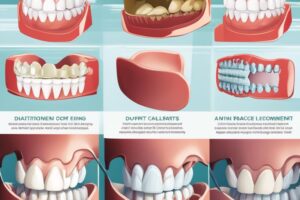Halitosis, also known as bad breath, affects millions of people worldwide and can have a detrimental impact on one’s self-esteem and social interactions. The good news is that maintaining proper oral hygiene practices can help combat this unpleasant condition and restore confidence in your smile. In this informative blog post, we will discuss the most effective oral hygiene practices to eliminate halitosis and keep your breath fresh and clean.
Key Takeaways:
- Regular Brushing and Flossing: Maintaining a consistent oral hygiene routine is crucial in combatting halitosis. Brushing and flossing help to remove food particles, plaque, and bacteria that can contribute to bad breath.
- Use of Antimicrobial Mouthwash: Incorporating an antimicrobial mouthwash into your oral hygiene routine can help to kill bacteria that cause bad breath and provide long-lasting fresh breath.
- Regular Dental Check-ups: Visiting your dentist regularly for professional cleanings and check-ups is essential in preventing and treating halitosis. Your dentist can identify and address any underlying dental issues contributing to bad breath.
Daily Oral Hygiene Practices
While maintaining proper oral hygiene is crucial in combating halitosis, it is equally important to follow a consistent daily oral hygiene routine. For more tips on oral hygiene practices to prevent bad breath, you can check out What Oral Hygiene Regiments Help Avoid Halitosis?
Regular Brushing Technique
For effective removal of bacteria and food particles from the mouth, it is essential to brush your teeth twice a day using a soft-bristled toothbrush in a circular motion. Pay special attention to the gumline and the back of your teeth, as these are common areas for bacteria accumulation. Additionally, don’t forget to brush your tongue to eliminate any bacteria that may contribute to bad breath.
Flossing and Its Significance
Flossing is an essential part of oral hygiene as it helps in removing plaque and food particles from between the teeth and below the gumline. It is recommended to floss at least once a day to ensure thorough cleaning of the areas that a toothbrush may not reach. Regular flossing can also help prevent gum disease, which is a common cause of bad breath.
Daily flossing helps in maintaining healthy gums and preventing bad breath caused by accumulated food particles and plaque between teeth.
The Role of Tongue Cleaning
One often overlooked area of oral hygiene is the tongue. Cleaning the tongue with a tongue scraper or a toothbrush can help remove bacteria and food debris that can contribute to bad breath. Incorporating tongue cleaning into your daily oral hygiene routine can significantly improve your overall oral health and combat halitosis.
Any oral hygiene routine is incomplete without including a thorough tongue cleaning to eliminate bacteria and food debris that cause bad breath.
Choosing the Right Oral Care Products
After recognizing the importance of oral hygiene in combating halitosis, the next step is selecting the right oral care products to incorporate into your daily routine. With a wide range of options available in the market, it can be overwhelming to choose the most suitable products for your oral health needs. This chapter will provide guidance on selecting the right oral care products to effectively combat halitosis and maintain optimal oral hygiene.
Fluoride Toothpastes and Mouthwashes
With proven benefits in preventing tooth decay and strengthening enamel, fluoride toothpastes and mouthwashes are essential components of a daily oral hygiene routine. Fluoride helps to remineralize the teeth, making them more resistant to acid attacks, which can lead to bad breath. When choosing fluoride toothpastes and mouthwashes, look for products that are recognized by dental associations and have the American Dental Association (ADA) seal of approval for effective cavity protection and halitosis prevention.
Natural Alternatives for Oral Care
Mouthwashes containing natural ingredients such as tea tree oil, neem, and peppermint oil are gaining popularity among individuals seeking natural alternatives for oral care. These natural ingredients have antimicrobial properties that can help combat the bacteria responsible for causing bad breath. When considering natural alternatives, it is important to look for products that are free from artificial colors, flavors, and preservatives to ensure effective and safe oral hygiene.
To further enhance the effectiveness of natural oral care products, some individuals incorporate oil pulling, a traditional Ayurvedic practice using coconut oil, into their oral hygiene routine. Coconut oil has been shown to have antibacterial properties that can contribute to fresher breath and improved oral health. By incorporating natural alternatives into your oral care routine, you can effectively combat halitosis while minimizing exposure to potentially harmful ingredients found in conventional oral care products.
Dietary Considerations for Fresh Breath
Despite regular brushing and flossing, bad breath can still persist due to dietary choices. What we eat and drink can have a significant impact on the freshness of our breath. By making mindful dietary considerations, we can combat halitosis and achieve long-lasting fresh breath.
Foods to Avoid
Breath odors can be exacerbated by certain foods and beverages. Strong-smelling foods such as garlic, onions, and spices can linger in the mouth and contribute to bad breath. Additionally, acidic foods and beverages like citrus fruits, tomatoes, and coffee can create an environment conducive to bacteria growth, leading to unpleasant odors.
Foods to Include
Foods that can aid in freshening breath include crunchy fruits and vegetables like apples, carrots, and celery, which can help scrub away bacteria and plaque. Additionally, foods high in fiber such as whole grains and legumes can promote saliva production, which helps wash away food particles and bacteria. Incorporating more water and green tea into your diet can also help maintain fresh breath by keeping the mouth hydrated and flushing out odor-causing bacteria.
Fresh breath can be achieved by incorporating more fresh, whole foods into your diet, while avoiding strong-smelling and acidic foods and beverages. The foods we consume have a direct impact on the overall health of our mouths, and making conscious choices can lead to improved breath and oral hygiene.
Professional Care and Regular Check-Ups
Unlike regular brushing and flossing, professional care and regular dental check-ups play a crucial role in combating halitosis. Visiting a dentist regularly can ensure that any underlying dental issues are addressed in a timely manner, preventing bad breath.
Importance of Dental Visits
Care for your oral health involves more than just daily brushing and flossing. Regular dental visits are essential to maintain good oral hygiene and prevent halitosis. During these check-ups, the dentist can thoroughly examine your teeth and gums, identify any potential issues, and provide appropriate treatment.
Advanced Treatments for Halitosis
Regular dental visits are crucial for identifying and addressing halitosis. For those with persistent bad breath, advanced treatments may be necessary. Below is a breakdown of advanced treatments for halitosis:
- Professional cleanings: Removal of plaque and tartar buildup
- Scaling and root planing: Deep cleaning for gum disease treatment
- Restorative procedures: Repairing cavities and damaged teeth
- Oral hygiene education: Guidance on proper oral care practices
Any individual experiencing chronic bad breath should seek professional dental care to address underlying issues and receive targeted treatment. Professional cleanings, scaling and root planing, restorative procedures, and oral hygiene education are all essential components of advanced halitosis treatment.
Conclusion
Considering all points discussed in this article, it is clear that oral hygiene practices play a crucial role in combatting halitosis. From regular brushing and flossing to using mouthwash and tongue scrapers, there are various ways to maintain good oral health and prevent bad breath. It is important to address any underlying dental issues and to visit a dentist regularly for check-ups and cleanings. By following these oral hygiene practices consistently, individuals can effectively combat halitosis and maintain fresh breath. It is essential to prioritize oral hygiene as a part of overall health and wellness.
Oral Hygiene Practices To Combat Halitosis
Q: What causes halitosis (bad breath)?
A: Halitosis can be caused by a variety of factors, including poor oral hygiene, bacteria in the mouth, gum disease, oral infections, dry mouth, certain foods, smoking, and medical conditions such as diabetes or sinus infections.
Q: What oral hygiene practices can help combat halitosis?
A: To combat halitosis, it’s important to maintain a good oral hygiene routine. This includes brushing your teeth at least twice a day, flossing daily, using a tongue scraper to remove bacteria and food particles from the tongue, and using an antimicrobial mouthwash. It’s also important to stay hydrated and visit your dentist regularly for professional cleanings and check-ups.
Q: Are there any specific foods or drinks that can help prevent halitosis?
A: Yes, certain foods and drinks can help combat halitosis. Eating crunchy fruits and vegetables like apples, carrots, and celery can help clean your teeth and stimulate saliva production, which can help wash away bacteria. Drinking plenty of water can also help keep your mouth hydrated and reduce bad breath. Additionally, chewing sugar-free gum with xylitol can help stimulate saliva flow and prevent dry mouth, which can contribute to halitosis.






